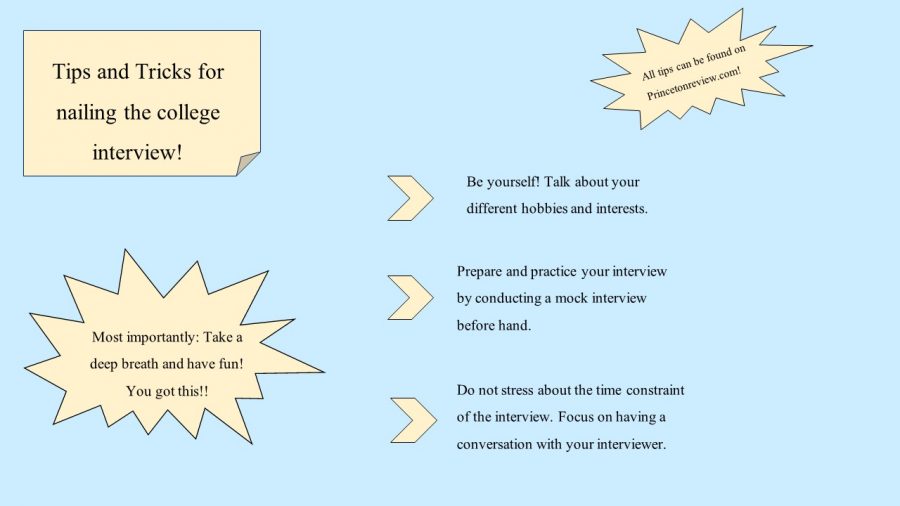College Interview Season is Here
February 12, 2021
For soon to be graduated senior Mia Bernasol the college application one was stressful. She had to take in consideration many different schools that benefited her wish to play golf in college and benefited her family in the process.
This is the case for most seniors who are graduating, they all need to think about the different aspects that go into the application process. How where they choose to apply and attend college not only benefits them but also their families.
There are many different aspects of the college application process one of which is the college interview. The main purpose of a college hosting an interview is to give the prospective student the opportunity to showcase their depth and personality instead of just being words on a page.
“Test scores and transcripts can only tell them [the colleges] so much about a person, whereas interviews help colleges to learn more about an applicant’s goals, interest in the school and ultimately determine if the applicant would be a proper fit at their university,” counselor Rebecca Voss said.
Though the interview process can be a scary time for many seniors, adequate preparation is the key to success.
“In this time [application process] it is very important to just stay calm and not think about it too much, because everyone will agree that getting results back from colleges is a very stressful time,” Loyola University student Leo Bruni said.
Typically, the types of colleges that will be hosting interviews are highly selective or private colleges such as Northwestern, Wheaton and Grinell.
“I had an interview with an alumni of Penn State for Penn State’s Honor College,” North alumni Helena Grad said. “The interviewer asked me basic questions in the beginning, such as why I wanted to go to the college, my interests/hobbies, if I had a job and what extracurriculars I was involved in.”
Additional types of questions that students can expect during an interview include: tell me about yourself? What do you plan on majoring in? Who do you most admire?
According to blog.prepscholar.com, “This interview gives the college you’re applying to another opportunity to evaluate you and help determine whether or not to offer you admission.”
Students are able to prepare for their interview by researching different different questions and going over how to answer them before the interview.
“I prepared by reviewing with myself about the reason(s) I am doing this interview and how I can positively contribute to the institution,” senior Payton Bishop said.
Teachers and counselors can also be a resource for students to turn to when they are preparing for interviews.
“To help students prepare for a college interview, I am happy to review with them questions they may be asked, have a mock interview with them, or even help students prepare their own questions that they would want to ask of their interviewer,” Voss said.
Interviews may not be as intimidating as many students believe. Sometimes the interview feels like a conversation with an old friend.
“We were both always laughing and sharing stories about our lives,and I was a little sad when the interview ended, because I felt I had more to ask and say,” Grad said.
A college interview can also benefit some students by narrowing their interests to just one or two schools.
“The interviews did help me in my college decision,” Bishop said. “I have committed to Aurora University, and the interviews that I had with my admissions counselor and basketball coach were the most helpful part in choosing that school.”
Some colleges do not require an interview as part of the application process. Or, some universities have what is called an optional interview. Foregoing the interview will not harm the students chances of getting accepted, so it is up to the student to decide whether or not they wish to participate.
However, according to collegebasics.com an interview can help. It “…show(s) the college you have taken time and interest in them.”
An interview tip that students might want to look into is sending a thank you note to the person conducting the interview to show that they are still interested in the University.
According to princetonreview.com, “if there’s something about the interview that was helpful to you, let your interviewer know.”







